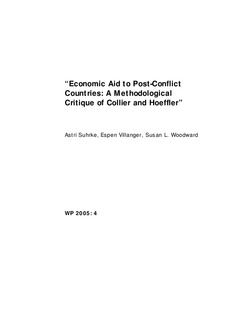"Economic Aid to Post-Conflict Countries: A Methodological Critique of Collier and Hoeffler"
Working paper
Permanent lenke
http://hdl.handle.net/11250/2435988Utgivelsesdato
2005Metadata
Vis full innførselSamlinger
- Bora-import [434]
Sammendrag
This paper retests the analysis of “Aid Policy and Growth in Post-Conflict Societies,” by Paul Collier and Anke Hoeffler (October 2002 and forthcoming in European Economic Review). It finds that their data and analysis do not support their conclusions and policy recommendations on the optimal timing and amounts of aid. These conclusions depend on very few observations (13 for the period of peace-onset, 13 for years 4 to 7 when a growth spurt is said to make aid particularly effective, and 8 for the period when aid should taper off); are vulnerable to the same methodological misspecifications identified in the Burnside and Dollar approach on which this analysis is based; and are not grounded in any theoretical formulation about the special relation between aid and growth in post-conflict conditions.Conventional econometric procedures are often not followed; recoding the sample to exclude cases that are not civil wars reduces the effect of aid on growth in post-civil war countries to less than half of what they claim; and the difference with the relationship for “normal” countries becomes negligible (0.26 percentage points), although it depends on identification of the sample. Their claims on the poverty-efficiency of aid are assumed, not analysed. The confidentiality of their policy measure (CPIA) prevented testing the aid-policy relationship.
Utgiver
Chr. Michelsen InstituteSerie
CMI Working paperWP 2005: 4
